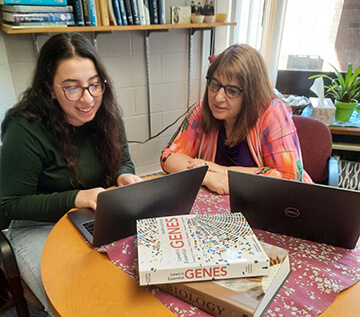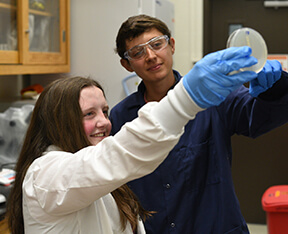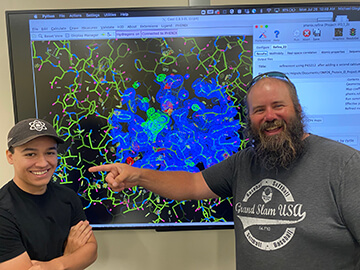RIT HHMI Inclusive Excellence


RIT HHMI Inclusive Excellence
In June of 2017, College of Science faculty, staff and students launched a five-year plan to foster a more inclusive environment across the College. The Inclusive Excellence initiative is funded by a $1M grant from the Howard Hughes Medical Institute (HHMI).
The Inclusive Excellence (IE) initiative is increasing diversity among undergraduate science majors, which includes development of a strategy for supporting success. The project increases infrastructure, resources, and expertise to strengthen inclusion in STEM education—embracing perspectives, strengths, and insight from a multicultural base of faculty, staff, and students in the College of Science. Included in this population are transfer students and first-generation students.
Over the 5-year project timeframe, the intent is to build community with multiple opportunities for discussion and formal and informal peer-collaboration. The goal is to engage 70 percent of the College of Science faculty (including new hires), and a majority of students in project activities, which will lead to campus-wide participation.
Multiple aspects are key to a successful student experience. They include a strong support network, inclusive environment that encourages open and safe conversation and good listening, and tools to understand themselves and others.The focus is on three distinct areas that support successful student experiences:
-
Research/Mentoring
engages faculty in discussion about identifying, recruiting, and mentoring a diverse student population in the research lab. -
Classroom Practice/Teaching
introduces faculty to metacognitive strategies that improve student learning. -
Informal Community
fosters a welcoming and inclusive environment in the College of Science.
This program is supported in part by a grant to RIT from the Howard Hughes Medical Institute through the Science Education Program.
Strand 1: Research
This key focus area engages faculty in discussions about identifying, recruiting, and mentoring a diverse student population in their research, in and out of the lab. Faculty workshops discuss both general mentoring strategies (e.g. setting goals) as well as topics specific to the target populations (e.g. DHH communication strategies or mentoring across gender and racial divides). Engaging faculty in discussions is our means to the end—helping faculty create more inclusive research lab environments and more welcoming mentoring experiences.
Research Cohorts
The Research Cohorts meet bi-weekly and discuss readings, share experiences, and take part in short activities—all strengthening their sills and awareness pertaining to diversity, inclusiveness, and building a welcoming environment in the classroom, laboratory and on campus. The cohorts are led by the Inclusive Excellence Initiative co-director, Dina Newman and Research Strand leader, Lea Vacca Michel. Each year a new group of faculty research members are added to the project.
The Hudson Lab trains the next generation of scientists to solve today’s problems and prepares them for future and emerging scientific issues. Dedicated to addressing the problem of antibiotic resistance, Dr. André O. Hudson and his group focus their research on the identification and characterization of novel antibiotic lead compounds. They use techniques and approaches from biochemistry, molecular biology, bioinformatics, genomics, and microbiology. In addition, the lab has ongoing projects addressing various aspects of amino acid metabolism and microbial genomics.
Dr. Xu is an Assistant Professor in the School of Physics and Astronomy and in Microsystems Engineering at RIT. His group works on two-dimensional (2D) materials, an emerging category of material that is molecularly thin (such as graphene), and has shown great potential for future high-speed energy-efficient electronic and optoelectronic devices. Currently, he and his students focus on understanding ion-electron transport at the molecular level, and their goal is to utilize their new finding to develop next-generation devices for artificial synapses, neuromorphic computing, and hardware security.
In his lab, the students will have the opportunity to learn the state-of-the-art electronic device fabrication and characterization techniques, as well as utilizing finite element modeling to simulate and optimize device performance. For example, students can get trained on using the Atomic Force Microscope (AFM) to identify and characterize 2D materials, and measuring their electrical properties in the cryogenic vacuum probe station.
His research is highly multidisciplinary and welcomes students from any related majors who have an interest and curiosity in Physics, Electronics, or Ionics.
Dr. Mohapatra is focused on using theory and simulations to decipher the design principles used by cells to assemble organelles within them. Just like human bodies have organs to complete various biological functions, cells have distinguishable sub-cellular parts called organelles, each specifically designed for its own specialized tasks. Dr. Mohapatra’s lab uses math, physics and computation to study how cells measure and control the size of their organelles. This research project would be a quantitative study of strategies used by cells to disassemble structures.
Dr. Brini’s lab studies the thermodynamic properties of soft matter systems. Free energy is the driving force of chemical and biochemical processes. We develop and employ physics based computational tools to estimate it quickly and reliably. Our main research area focuses on understanding and characterizing protein-protein interactions. We are also interested in small molecules solvation, and in the production of material properties.
Dr. Lam works on observations of pulsars, the exotic remnants of high-mass dead stars. The lab observes these stars as laboratories for fundamental physics and as probes of the Galazy’s interstellar medium. His work largely connects with the North American Nanohertz Observatory for Gravitational Waves, which uses observations of these pulsars to detect gravitational waves.
Dr. Maki’s research will focus on a phenomenon called the coffee-ring effect. When coffee spills on a table, after the coffee dries (evaporates) it leaves behind a ring-like pattern (a particle deposition pattern). This pattern is called the coffee-ring effect. Professor Schertzer’s research group conducts experiments where drops of water mixed with particles are dried at room temperature on different kids of surfaces. They find interesting deposition patterns left behind when a droplet of water containing micron-sized particles is evaporated on heterogeneous surfaces (a surface with printed patterns). They hypothesize that the printed patterns cause local differences in the movement of the edge of the droplet. In this research project we explore this hypothesis by approximating a system of equations characterizing the flow of the liquid/particles in the drop as it evaporates.
Dr. Nasserasr works in the School of Mathematical Sciences. The project for this summer will involve patterns of matrices and their structures. We will look at matrices when some of the entries are not known, and look for cases when unknown entries can be filled with values so that the matrix has a desired property.
Dr. Lucia Carichino is an Assistant Professor in the School of Mathematical Sciences at RIT, with a specialty in Mathematical Biology. The focus of her research is on mathematical and computational models of multiscale biological systems. Her work is motivated by the need for new tools to interpret experimental data in biology and medicine. Her group develops models of ocular dynamics and micro-swimmers locomotion. In the eye, her group studies how ocular diseases are related to vascular and structural changes, and study the interaction between contact lenses, tear film and the deformable eye. In relation to micro-swimmers, her group studies hydrodynamic and biochemical interactions in sperm motility. Learn more about her research
Dr. Eli Borrego is an Assistant Professor in the Thomas H. Gosnell School of Life Sciences. He explores the role of a group of hormone-like lipid signals, known as oxylipins, in plants. These molecules have revolutionized medicine, where nearly 80% of drugs target pathways under oxylipin control, but outside of mammals little is known regarding their biosynthesis, function, or signaling. The Borrego research group combines genetic, molecular, and biochemical tools with transcriptomic, lipidomic, and metabolomic technologies to answer oxylipin-related questions in biology, biochemistry, plant pathology, entomology, and mycology. The groups emphasis is to elucidate oxylipins in agro-economically relevant processes of crops, such as during defense against pathogens and insects, tolerance during drought, and heavy metal accumulation. In addition to the molecular biology and biochemistry laboratory component, this work utilizes field and greenhouse spaces.
Dr. Eli Borrego is an Assistant Professor in the Thomas H. Gosnell School of Life Sciences. He explores the role of a group of hormone-like lipid signals, known as oxylipins, in plants. These molecules have revolutionized medicine, where nearly 80% of drugs target pathways under oxylipin control, but outside of mammals little is known regarding their biosynthesis, function, or signaling. The Borrego research group combines genetic, molecular, and biochemical tools with transcriptomic, lipidomic, and metabolomic technologies to answer oxylipin-related questions in biology, biochemistry, plant pathology, entomology, and mycology. The groups emphasis is to elucidate oxylipins in agro-economically relevant processes of crops, such as during defense against pathogens and insects, tolerance during drought, and heavy metal accumulation. In addition to the molecular biology and biochemistry laboratory component, this work utilizes field and greenhouse spaces.
Dr. Lucia Carichino is an Assistant Professor in the School of Mathematical Sciences at RIT, with a specialty in Mathematical Biology. The focus of her research is on mathematical and computational models of multiscale biological systems. Her work is motivated by the need for new tools to interpret experimental data in biology and medicine. Her group develops models of ocular dynamics and mico-swimmers locomotion. In the eye, her group studies how ocular diseases are related to vascular and structural changes, and study the interaction between contact lenses, tear film and the deformable eye. In relation to mico-swimmers, her group studies hydrodynamic and biochemical interactions in sperm motility. To learn more about her research visit: https://sites.google.com/site/lcarichino/.
Dr. Michael Coleman is an Associate Professor of Chemistry. His research groups interests are focused on the development of Earth-abundant transition metal complexes and innovative chemical transformations for the selective catalytic cleavage and formation of C-H, C-C, C-O, and C-N bonds from readily available organic starting materials. Special emphasis is placed on sp2-hybridized prochiral centers because of the mechanistic insights gained from the chemo-, regio-, and stereochemical outcomes.
Dr. Pratik Dholabhai is a computational materials scientist whose expertise is in the application of atomistic simulation methods such as density functional theory and molecular dynamics, and the development of kinetic Monte Carlo methods to study and design materials at the nanoscale. His research focuses on integrating fundamental physics, materials science, and chemistry in conjunction with state-of-the-art computational tools to study and design materials with novel functionalities. At RIT, Pratik leads the Multiscale Materials Modeling and Design (MMMD) group, which uses atomistic simulation methods to study materials at various length and time scales. Multiscale Materials Modeling and Design Group Website
Dr. Elena Fedorovskaya is a Research Professor in the Integrated Sciences Academy. Elena studies how we perceive and respond to images, from simple color patches to complex scenes and visual art, using methods of psychophysics, eye tracking, and electrophysiology. Do we pay attention to some colors more than others? How do sounds affect our perception of colors and their salience? Does expertise and training matter when we view art? And can we differentiate patterns of eye movements of expert and novices using machine learning? These are some of the questions Elena is addressing in her research.
Dr. Maureen Ferran is an associate professor in the Thomas H. Gosnell School of Life Sciences. One aspect of research in the Ferran lab focuses on how two different mammalian viruses evade the host immune response and the development of viruses as a cancer therapy that specifically kill cancer cells while leaving healthy tissue alone. This work requires virus work, molecular biology, and tissue cell culture techniques. The lab is also involved in a collaborative project with Dr. Hans Schmitthenner in the School of Chemistry and Material Sciences. Dr. Hams synthesizes Molecularly Targeted Imaging Agents (MTIA) and we test them to determine if these imaging agents are able to detection and treat of breast cancer. This project also involves standard techniques in molecular biology and tissue cell culture.
Dr. Gregory Howland is an Assistant Professor in the School of Physics and Astronomy. The Howland lab experimentally explores Quantum Photonic Technologies. Quantum Photonics exploits the peculiar and non-intuitive properties of single photons---elementary particles of light---to realize transformative applications including exquisitely precise sensing, extreme low-light imaging, unconditionally secure communication, and exponentially faster computing. It is an exciting time to work in quantum technologies as the field has reached an inflection point where practical devices are starting to leave the laboratory and become useful. One powerful new tool the Howland lab uses are integrated photonic circuits that can pack thousands of optical elements onto a tiny silicon chip. Activities in the lab range from the very fundamental, such as characterizing quantum entanglement, to the very applied, such as taking a picture with only a few photons.
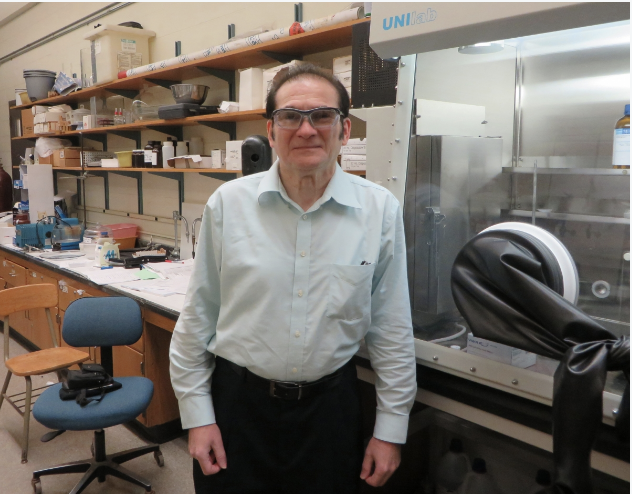
Dr. Massoud (Matt) J. MIri
Associate Professor
School of Chemistry and Materials Science
(585) 475-6004
mjmsch@rit.edu
Profile
Dr. Massoud (Matt) Miri is an Associate Professor in the School of Chemistry and Materials Science and his main research area is Polymer Chemistry. His research focuses on the synthesis and development of more sustainable polymers, mainly plastics. To resolve the issues with fossil fuels, currently used as starting materials for plastics, his group applies renewable resources, which are mostly compounds found in plants, e.g. lignin derivatives. Some of these renewable materials can be directly used as the building blocks, i.e. monomers, for polymerizations. His group also applies chemical reactions to convert renewable materials into useful monomers. They also characterize key properties of the synthesized polymers to evaluate their effectiveness for target applications. To reduce environmental issues arising from polymer waste, such as increasing landfills or marine pollution, his group investigates the degradation of polymers, simulating conditions in a compost or aqueous environment. There are many advantages of synthesizing new sustainable polymers over just blending fossil fuel based polymers with renewable compounds, such as starch or plant oils. The chemical bonding can result in more uniform and longer lasting, thermal and mechanical properties than those obtained from the polymer blends.
Dr. Shima Parsa, assistant professor of Physics at RIT, is an experimental Physicist with a passion for water and environmental issues. She uses microfluidics to simulate environmental phenomena such as water infiltration, in lab. Her research focuses on the microscale dynamics of fluids within the pores of rocks with application in groundwater remediation. In particular, she studies the dispersion of organic contaminant by analyzing the dynamics of emulsion droplets in 2D porous media using fluorescent microscopy.
Dr. Christa Wadsworth is an evolutionary biologist whose research focuses on antimicrobial resistance in bacteria. Resistance is one of the greatest and most critical public health crises of our time, raising the specter of untreatable infections and a return to the pre-antibiotic era. Research in the Wadsworth Lab is motivated by nominating new mechanisms of resistance in pathogen species, and characterizing the reservoir of resistance alleles available to pathogens in commensal species and their potential for horizontal transfer. Related topics of interest include microbial speciation, niche specialization, and adaptive evolution. The lab uses a wide array of experimental approaches, combining genomics and wet-lab techniques.
Dr. Tony Wong is an Assistant Professor in the School of Mathematical Sciences. Tony's research centers on addressing the implications of the uncertainty that is inherent in all models and data, and examining how best to constrain and characterize these uncertainties and their effects on decision-making. In particular, Tony's work examines how uncertainty in climate model projections, and sea-level rise in particular, can lead to suboptimal, ineffective, and - at worst - outright dangerous policy decisions. This requires accounting for not only varying forms of uncertainty in model parameters and projections, but deep uncertainty - uncertainty in the uncertainty in model structure and parameters. Statistical calibration and sensitivity analysis approaches allow us to constrain these models and characterize the uncertainties inherent in both the model and data, and are a critical part of any modeling effort. Tony’s research uses statistical and mathematical modeling tools to evaluate the uncertainties in hazards exacerbated by climate changes, and investigate which geophysical or socioeconomic factors are related to future climate risks, in order to inform strategies to manage those risks.
Nathan Eddingsaas is an Assistant Professor in the School of Chemistry and Materials Science and is an analytical, atmospheric, and environmental chemist. His work focuses on the chemical and physical characterization of aerosols including atmospheric aerosols and aerosols generated from nicotine delivery devices. For atmospheric aerosols his group studies the thermodynamics of phase separation, and how aerosols evolve over time including chemical reactions that occur within aerosols and what happens to semivolatile compounds. For aerosols generated from nicotine delivery devices his group studies how user puffing profiles and product characteristics influence the production of aerosols, and the amount of nicotine, volatile aldehydes, and other harmful or potentially harmful compounds introduced to the user.
Carrie McCalley is an Assistant Professor in the Environmental Science Program in the School of Life Sciences. Her work investigates how ecosystem responses to environmental change will impact the atmospheric chemistry of climate. She is particularly interested in the mechanisms underlying methane emission from wetlands; studying the impacts of management and land-use on local wetland habitats and the role of permafrost thaw in changing carbon metabolism in northern peatlands. She is involved in interdisciplinary collaborations that combine molecular, geochemical, remote sensing and modeling approaches to understand feedbacks between human activity and ecosystem function. Dr. McCalley’s research interests are in the following areas: Biogeochemistry, Ecosystem Ecology, Global Change Biology, Biosphere-Atmosphere Interactions, Wetlands, and Isotope Geochemistry.
Our research entails the discovery and characterization of new enzymes. The enzymes either come from model bacteria such as E. coli or pathogenic bacteria such as M. tuberculosis M. leprae, Y. pestis, or Staph. aureus. The enzymes from pathogens are potential novel antibiotic targets. We study members of either the Nudix hydrolase superfamily or the HAD superfamily; in this way we can understand family relationships as well. Students in the lab do bioinformatics to uncover new enzymes, clone the genes, and express, purify, and characterize the proteins. We also do knock-out mutagenesis to determine the role of these enzymes in the cell.
Michael S Pierce, Ph.D. is an Associate Professor in the School of Physics and Astronomy and the Director of the MS Materials Science and Engineering program within the School of Chemistry and Materials Science. He is an experimental condensed matter physicist, with interests in surfaces & interfaces, nanomaterials, magnetic systems, and more. The materials studied often have application for energy storage, conversion, or cleaner production through catalysts. This research is often at the boundary between physics and chemistry, giving students from a variety of backgrounds an opportunity to contribute. His laboratory maintains an ultra high vacuum surface science instrument, along with a customized x-ray diffraction hutch.
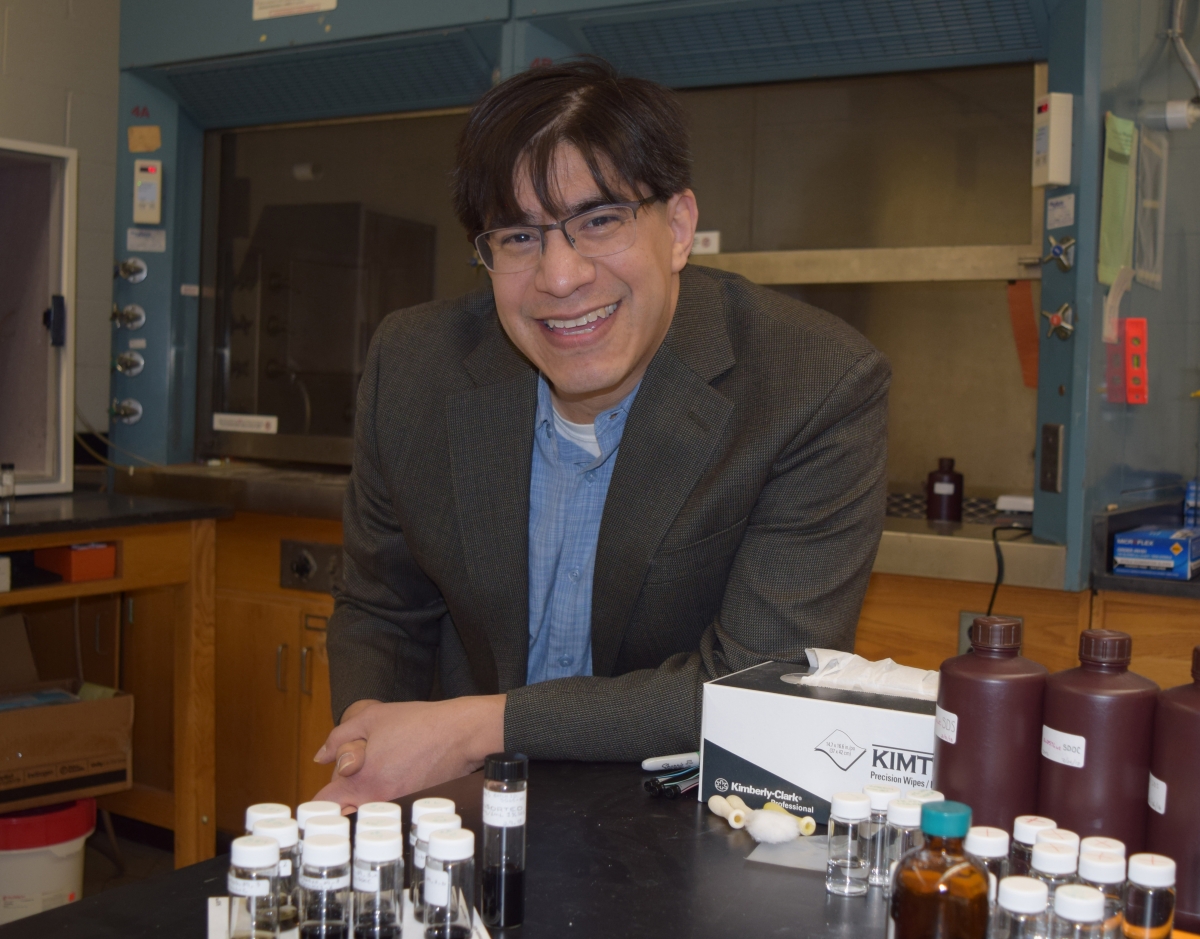
Dr. John-David R. Rocha
Assistant Professor
School of Chemistry and Materials Science
(585) 475-5150
jrrsch@rit.edu
Profile
As a Postdoctoral Researcher at the National Renewable Energy Laboratory (NREL), Dr. Rocha investigated the hydrogen sorption capacity of novel carbon-based nanomaterials using optical spectroscopic methods, and he also expanded studies of fundamental SWCNT photophysical properties and changes due to refined separation techniques. During his doctoral studies at Rice, he advanced the use of SWCNT fluorescence emission spectroscopy as an analytical characterization method through the design and assembly of a unique real-time fluorimetric analyzer for SWCNTs, now sold commercially as the NanoSpectralyzer (Applied NanoFluorescence, Houston, TX).
Before coming to RIT, Dr. Rocha was a Research Scientist at SouthWest NanoTechnologies (SWeNT, Norman, OK).
Gary R. Skuse, Ph.D. is a Professor in the Thomas H. Gosnell School of Life Sciences. His current research builds upon his long standing interests in human cancer genetics and it is being performed both in vitro and in silico. The wet-laboratory component is looking at the demonstrated ability of a synthetic dye to selectively kill cancer cells while sparing normal cells. His research group is exploring its use as a chemotherapeutic agent in a number of cancer and non-cancer cell lines while developing an effective means of delivering the agent to where it is needed. The computer-based component uses natural language processing software, and a significant amount of human curation, to identify interactions between genes and environmental factors that play a role in the progression to metastasis in ovarian cancer.
Julie Thomas is an Assistant Professor in the School of Life Sciences. Her research focuses on viruses that infect bacteria (called phages), in particular “giant” phages that have complex virions and long genomes. Her lab mainly conducts research on a phage that infects the food-borne pathogen, Salmonella enterica. They study this phage as a model “organism” for related phages that are used for phage therapy and biocontrol purposes. Dr. Thomas is interested in understanding the molecular mechanisms by which this virus infects, replicates within, and ultimately kills the Salmonella cell. She is particularly interested in understanding virion assembly and determining which virion proteins have roles in host takeover, and their functions.
Michael Zemcov is an Assistant Professor in the School of Physics and Astronomy, the Center for Detectors, and the Astrophysical Sciences and Technology program.
His work focuses on measuring the large scale structure of our universe, and understanding its constituents, evolution, and ultimate fate. He is particularly interested in building small-scale experiments devoted to understanding the history of light production and matter in the cosmos. He is involved in a number of large experimental programs, including CIBER, TIME, SPHEREx, and other NASA missions devoted to better understanding our place in the universe.
Dr. Zemcov's research interests are in the following areas: Cosmic Backgrounds, Galaxies and Galaxy Clusters, the History of Star Formation in the Universe, Dark Matter, Technology Development, and Science Education.
Dr. Collison’s group works chiefly with Squaraine molecules, synthesized at RIT by Dr. Jeremy Cody, where we look to control structural morphology to form aggregates. The excited state properties and spectroscopic features of these aggregates can be predicted computationally through essential states modeling in a collaboration with Frank Spano at Temple University. The group looks to determine how the various aggregation states influence exciton dissociation at the bulk heterojunction interface in our devices; the group models the materials properties and measures the performance of devices made in its state of the art lab to validate its hypotheses.
From embryogenesis, to osteoarthritis, to cancer, physical forces and mechanical properties of tissues play a key role in health and disease. Many physical models of tissues largely focus on a single level of complexity e.g. individual cells or large collections of cells. A multi-scale approach is critically needed to address the complex interplay of mechanisms at each level, and bridge the gap between models at different levels. My long-term goal is to use multi-scale modeling to explain how mechanical forces are sensed and transmitted from molecules to cells to tissues, and how these processes impact tissue dynamics, properties, and biological functions. To this end, my group uses a combination of analytical theory and computer simulations to investigate time-dependent mechanical properties of tissues based on interplay of mechanics, geometry, and statistical physics of underlying components. Our models are informed and tested via close collaborations with experimental labs.
Jeyhan Kartaltepe is an Assistant Professor in the School of Physics and Astronomy and in the Astrophysical Sciences and Technology program. Her work focuses on understanding how galaxies formed and evolved to become like the ones in the nearby universe. She is particularly interested in the role played by galaxy mergers and interactions and how that role changed over time. She is involved in a number of large multiwavelength surveys that make use of major facilities all around the world, including Keck, Hubble, and the soon to be launched James Webb Space Telescope.
Dr. Kartaltepe’s research interests are in the following areas: Galaxy Formation and Evolution, Galaxy Mergers and Interactions, Infrared Galaxies, Active Galactic Nuclei (AGN), Galaxy Morphology Education and Public Outreach.
Lea Vacca Michel, Ph.D. is an Associate Professor in the School of Chemistry and Materials Science at the Rochester Institute of Technology. Currently, her work is focused on dual oriented bacterial lipoproteins and crystallin proteins which are localized in the eye lens. Dr. Michel is the Chair of the Women in Science program at RIT, Director of the Rochester Project SEED program, and Director of the Research Strand for the HHMI-funded Inclusive Excellence @ RIT program; she strives to increase the participation of women and minorities (including those who are deaf and hard-of-hearing) in science and math. Her research interests include: Biochemistry, Biophysics, Vaccinology, Immunology, and Structural Biology.
Dr. Schmitthenner is the lead in the Schmitthenner Research Group. The philosophy in the lab is to apply fundamental aspects of chemistry and imaging science to practical applications in medical imaging and cancer research. Their research involves a mix of peptide, dye and organometallic chemistry combined with fluorescence, photoacoustic, MRI and PET imaging. The goal is to transform screening and early diagnosis of cancer by creating novel imaging agents that specifically target cancer cells. Our strategy incorporates new synthetic methods which we developed at RIT for preparing single and multi-modal imaging agents.
Dr. Stack Whitney is environmental scientist who uses insects to ask: can we make human-dominated landscapes more friendly to wildlife? She has conducted ecology research in a wide variety of landscapes, from tundras in Alaska to mountains in Uganda to farms in Wisconsin and India. Before coming to RIT, Dr. Stack Whitney worked for the US Department of Agriculture’s Farmer to Farmer Program, as well as the US Environmental Protection Agency Office of International & Tribal Affairs and Office of Pesticide Programs. Her research is interdisciplinary and highly collaborative, incorporating environmental humanities and social science often in partnership with historians, state agencies, and theoreticians.
Potential Projects:
- Evaluating novel urban ecosystems (e.g. solar arrays) as habitat for wild bees and other insects
- “Global Urban Evolution” collaborative international survey of urban plant adaptations
- Applications of machine learning for conservation and climate adaptation planning along roads
- Developing practices for more accessible field-based research
In cataract, the leading cause of blindness worldwide, concentrated mixtures of eye lens proteins can undergo liquid-liquid phase separation, and can also aggregate so as to scatter light, clouding the lens and degrading vision. Chemical inhibition of the responsible interprotein interactions could, in principle, delay visual impairment from cataract. To make an informed search for cataract inhibitors, it is important to understand the molecular basis of eye lens protein solution phenomena.
Dr. Thurston's current aims are to help develop the needed basic understanding of realistically concentrated fluid mixtures of eye lens proteins, including their phase transitions, equations of state, light scattering, and aggregation kinetics. He and his colleagues are using static and quasielastic light scattering, small-angle X-ray scattering and neutron scattering, Monte-Carlo simulation, and statistical thermodynamic models to develop this understanding.
Dr. Tyler’s research interests: Aquatic Ecology and Biogeochemistry, Wetlands, Invasive Species, Ecosystem Restoration
The Tyler Aquatic Ecology Lab @RIT research concerns the interaction between aquatic organisms and their biological and physico-chemical environment. Their work takes a two-pronged approach towards the interplay between organisms and their environment. The first asks fundamental questions about how organisms affect and are affected by their environment. The second investigates how these relationships change with anthropogenic disturbance. Past projects have evaluated a variety of primary producers, including native and invasive wetland plants, benthic microalgae and nuisance macroalgae. More recently, they are investigating the linkages, direct and indirect, among biodiversity (primarily of invertebrates), plant productivity, and biogeochemical processes.
As a result of increasing human populations in the coastal zone, both marine and freshwater, land-margin ecosystems are among the most heavily impacted ecosystems on Earth; human-associated pollution, destruction, and introduction of non-native species cause drastic perturbations from steady-state ecosystem structure and function. Understanding how aquatic organisms respond to, or create, perturbation and thereby affect biogeochemical cycling, water quality and higher trophic levels under these changing conditions is imperative to predicting future changes and dictating appropriate management strategies.
Potential Projects:
- Remote sensing innovations to assess carbon sequestration and resilience of coastal salt marshes
- Impacts of herbivores on plant community structure and nitrogen removal potential of created freshwater wetlands
- Innovations at the Food-Energy-Water Nexus: Ecological implications of food waste disposal technologies
Inclusive Excellence Summer Research Experience
The Inclusive Excellence Summer Research Experience will offer College of Science students in their first year at RIT (including transfer students) an opportunity to do research with a College of Science faculty mentor. Because our aim is to broaden our research groups to include a greater diversity of culture, experiences, and ways of thinking, preference will be given to students from nontraditional and underrepresented groups.
If you are selected for this fellowship program, you will be paired with a faculty research mentor and will be expected to work full-time in your mentor’s research group (~40 hours/week) over the summer for approximately 10 weeks. You will receive a stipend of $4,500 and will be eligible to receive additional funds for research supplies and travel to a conference.
Please submit any questions to Desirée Forsythe.
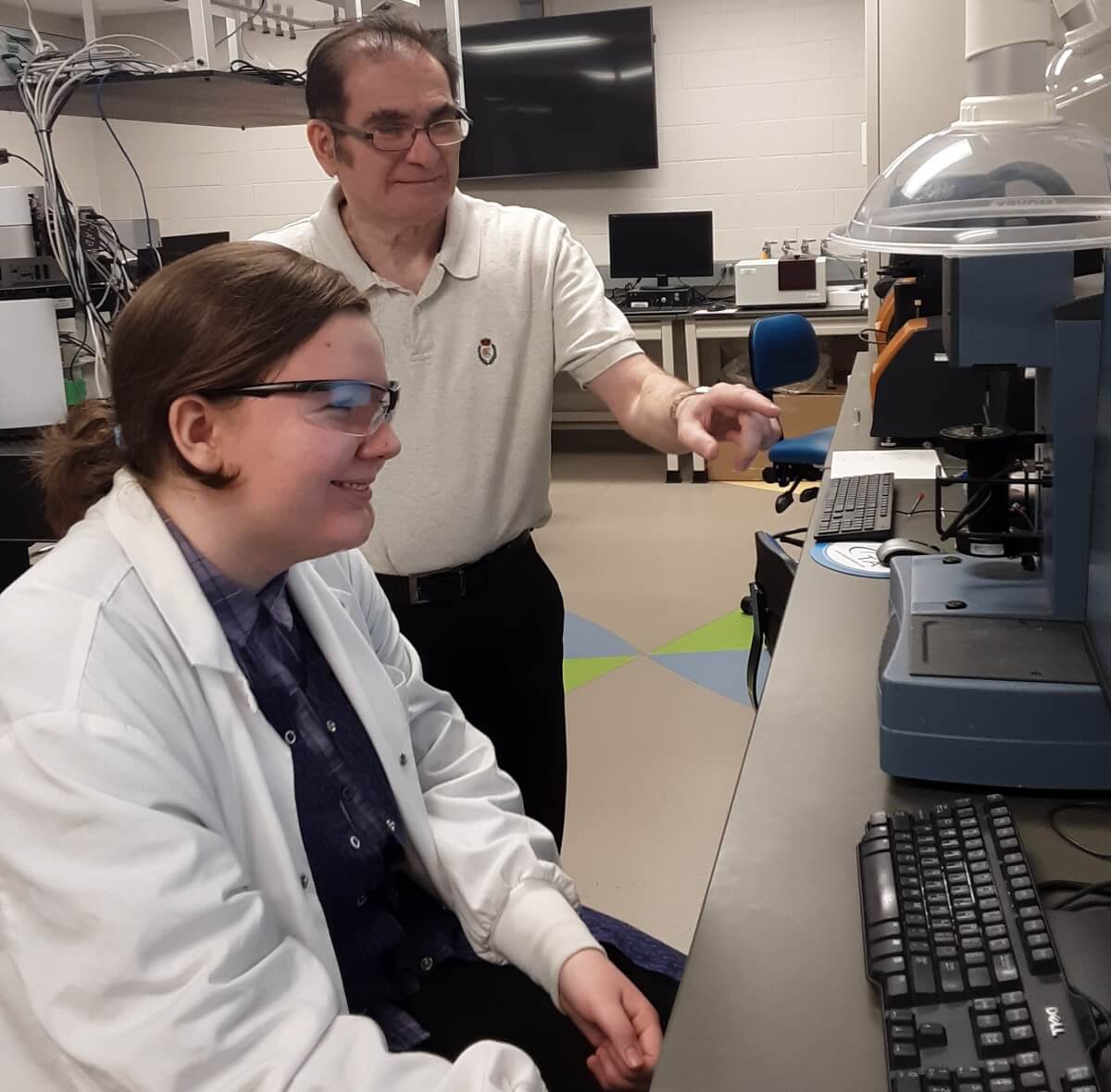
Student: Amina Andelija
Mentor: Dr. Matt Miri
College: Rochester Institute of Technology
Year: Rising Junior
Major: Chemistry
Pronouns: She, Her, Hers
Amina is the first in her family to go to college, and the first to show a real interest in science. Most of her family are war survivors, and she lost some family members in the 1990’s during the genocide in Bosnia.
She was interested in astronomy at a very early age, and during high school she was part of several science programs held at SUNY Oswego, which led to her interest in research.
“Two chemistry teachers in high school inspired me to go into chemistry, as I was good at that,” Amina commented. Physics was her second choice.
Amina is working with sustainable polymers this summer. There are two groups in her research team. The first group is synthesizing different types of polymers. The second group, Amina is part of, is characterizing the properties of polymers. They then analyze the polymer properties with lab instruments, looking at the surface, melting temperature and cooling temperature. They will analyze the sustainability of the newly formed polymers, which will be biodegradable as opposed to many of the current plastics made from petroleum.
The long-term goal, Amina explains is to eliminate plastics made from fossil fuels, which contribute to carbon emissions and Climate Change. Making more environmentally friendly, renewable and biodegradable plastics is the way to make plastics more sustainable. This research is looking for polymers with better properties while remaining environmentally conscious.
Amina will be presenting at the Inclusive Excellence symposium at the end of the summer session, and eventually contribute to a paper to be published. She comments that RIT has been helpful writing workshops offered on campus to fine tune abstract writing, among other writing skills.
Name: Deanna Abid
Mentor: Dr. Dina Newman
College: Rochester Institute of Technology
Year: Rising Senior
Major: Biotechnology and Molecular Bioscience
Pronouns: She, Her, Hers
Deanna is a Palestinian American born and raised in Rochester. She has four sisters, two of whom are RIT graduates. While not in school she likes to read and bake for relaxation. In the 5th grade her class went to the Rochester Museum and Science Center’s Challenger Learning Center. She was inspired to learn more about science, as she enjoyed using problem-solving skills. Having lived in Rochester, she says, gave her the advantage of being around RIT alumni, and that was an influence for her coming to RIT in the end.
Deanna is a transfer in the two plus two program from MCC to RIT. She transferred during the pandemic year and became familiar with RIT through virtual classes and connections.
This spring she was looking into different forms of RIT’s College of Science research, and found that the RIT Inclusive Excellence summer fellowship program was actually looking for transfer students as well. Fortunately Dr. Newman was looking for a student to join the Molecular Biology Education Research (MBER) lab, and they connected.
Deanna is investigating the different ways that DNA is represented in drawings, and which types of drawings are most common in various contexts. Her summer research project involves examining the diagrams and figures in genomics textbooks and primary literature. She is categorizing each figure according to a model developed by the MBER lab called the DNA Landscape, which considers both the scale and level of abstraction. She is uncovering some interesting patterns.
Deanna says she would like to continue this work in the fall semester, because there are so many more questions to ask.
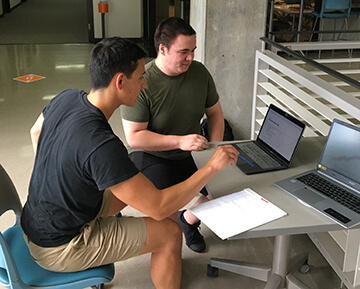
Name: Grayson Olin
Mentor: Dr. Tony Wong
College: Rochester Institute of Technology
Year: Rising Junior
Major: Applied Mathematics
Pronouns: He, Him, His
Grayson’s dad was doing computer programming with no formal degree (self-taught) from the time Grayson was very young. He grew up watching the family business grow from his Dad’s efforts. His uncle is a chemical engineer, so it runs in the family. “We are science adjacent,” Grayson comments.
Grayson started out by reading Michio Kaku’s science books, which in turn excited him to be a physicist. Kaku’s science language and enthusiasm was at a level where everyone could understand and be inspired to learn more about the world around them. In high school, Grayson felt as though his physics class was an easier version of math. He remembers his pre-calculus teacher prompted students to calculate the sum of numbers between 1 and 100. He realized this had to been done in an alternate way from using a calculator. He quickly figured out how to use a formula, seeing the numbers relating to each other that add up in a way to compute the answer. And that is when he became interested in math.
His research project this summer is modeling sea level rise over time and projecting into the future how that will change. Climate change! He is uniquely adding expert assessment to calibrate the model later on to see how it changes the accuracy of the model.
Grayson explains that the sea level rise can be mathematically figured with a differential equation, using data in past research to fill in some of the variables and then estimate those variables later to see which best reflect the sea level model. When asked how the initial measurement of sea level is made, he explains that space satellites can measure sea level.
The first goal is to add one bit of expert assessment, and at that point it then could go on for further research.
The summer IE research fellowship experience participants share a messaging group to gain research help from each other. Workshops on campus are held where all researchers come together to engage in experiential learning and discussions.
Name: Kayla Houston
Mentor: Dr. Crista Wadsworth
College: Rochester Institute of Technology
Year: Rising Junior
Major: Biomedical Sciences
Pronouns: She, Her, Hers
Kayla lives in Syracuse with her aunt. Her cousin who also lives there is like a sister to her. She became interested in science in high school at which time she took biology. She described her teacher as “an awesome teacher.” Her experiences in that class led to her interest in anatomy, which further sparked her interest in continuing her career path in science. Kayla decided to make that her major at RIT.
During her freshman year at RIT she received an email from Dr. Dawn Carter encouraging her to apply for the Inclusive Excellence Summer Fellowship program. Then Covid-19 hit, and the program was cancelled due to health concerns. This year RIT honored the application acceptance for Summer 2021, and she is happy to be a part of the experience.
Together with Dr. Crista Wadsworth, Kayla is studying antibiotic resistance in gonorrhea. She amplified a portion of the genome from a penicillin resistant strain using the polymerase chain reaction, and purified the product using gel extraction. These purified products were then transformed it into a penicillin susceptible strain. Kayla next measured the penicillin resistance levels of her transformant cells to see if she impacted their resistance phenotypes. Ultimately, their goal is to figure out the genetic basis of penicillin resistance which has been an unsolved mystery for over 30 years.
Kayla’s end result will be a poster in the symposium that will share the information with others.
Name: Ryhl Charles
Mentor: Dr. Michael Gleghorn
College: Rochester Institute of Technology
Year: Rising Sophomore
Major: Biology
Pronouns: He, Him, His
Ryhl was born in Ithaca, NY. He grew up in Athens, Georgia, yet spent most of his childhood in East Africa (Tanzania and Kenya). His parents both work for the United States government, and therefore his family moved frequently. His mother is originally from Bolivia, his dad from Ithaca, New York; both today live in Nairobi.
Ryhl moved back to the US in 2020 for his freshman year at RIT. Due to the pandemic, his classes were mostly virtual, with only a small portion in person. Communicating online wasn’t a forte of his, having grown up in East Africa where it wasn’t a strong means of communication. Ryhl shared that even a credit card was a new concept, as he grew up using cash only.
He is the first in his family to study the life sciences. He first became interested in this field spending time in his dad’s office and having the opportunity to go along with him on project visits in those countries. He also took advantage of interacting with a number of professionals from various departments in the Embassy, particularly the Health Office as they funded research and programs in maternal and child health, HIV/AIDS prevention, zoonic diseases, and other pertinent current health issues. Ryhl recalls this as a key turning point in his interest in life science. In high school he signed up for concentration in science courses, realizing a passion for the sciences, especially chemistry and biology.
Growing up in East Africa, he was familiar Ebola spread, malaria, and other prevalent infectious diseases. His interest in the RIT Inclusive Excellence research fellowship was an opportunity to pursue bacterial health issues by taking part in two major REU projects with Dr. Michael Gleghorn. These projects are:
VapC Project – Ryhl is researching a bacterial protein toxin that is thought to contribute to helping pathogenic bacteria remain dormant and therefore immune to antibiotics. VapC is an RNase that cleaves tRNA molecules. Through this study he is learning to understand the structural properties of this protein and how the structure dictates its function. He is working to solubilize this protein in the presence of tRNA to capture a complex for structure determination. This information might guide future drug discovery to inhibit the action of the RNase.
OMP-26 and Protein D Project – He will be structurally characterizing this protein using small angle X-ray scattering (SAXS) and X-ray crystallographic techniques. These proteins are derived from H. influenzae, an organism that causes ear infections. As such, and in collaboration with the Michel lab, characterizing these protein structures can lead to developing improved vaccines.
Ryhl is currently working towards obtaining a license to become an EMT and volunteer for the RIT campus ambulance. He also is enrolled in the NOLS (National Outdoor Leadership School), an outdoor EMT course.
His plan is continuing to engage in research, as his main goal is to be a doctor (possibly pulmonology) in the emergency room of a hospital. He is currently on the pre-med track. He wants his research and degrees to contribute to the medical field, apply his learning to his career, and doing his part in championing equity in health care.
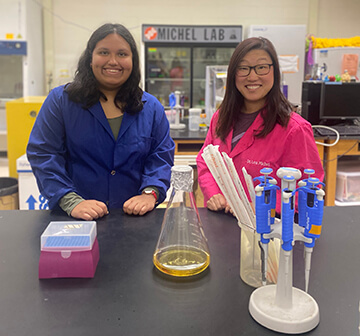
Name:
Mentor: Dr. Lea Michel
College: Rochester Institute of Technology
Year: Rising Sophomore
Major: Computational Mathematics
Pronouns: She, Her, Hers
Nidhi comes from a small island in the Indian Ocean, named Mauritius. Back home she has a younger brother, currently in high school, and her mother. Nidhi has had an outside-the-ordinary journey to RIT. Her first year was entirely on line, due to the COVID-19 pandemic. On the other side of the world (an 8-hour time difference), Nidhi often attended meetings and classes between 1 and 4am her time! However, now that she is at RIT, she has been able to join her research lab and campus in person.
“I am learning so much from this Inclusive Excellence fellowship experience,” she commented. “I had no lab experience before this, and I am so glad to be paired with Dr. Michel for the summer!.” Alongside gaining valuable lab skills, and having hands-on experience with scientific research, Dr. Michel’s work holds a special place in Nidhi’s heart. When she was 14 years old, her father died of sepsis. Having the opportunity to now contribute to Dr. Michel’s research to diagnose sepsis, through the IE fellowship, Nidhi feels like the match with her mentor was kismet.
Nidhi shares that sepsis is not only the most expensive condition treated in US hospitals, but also the leading cause of death. One major challenge for sepsis patients is that in 70.1% of cases, doctors cannot determine the causal pathogen. This is most likely due to aggressive antibiotics or localized infections.
“This is where our research comes into play,” she states. When a patient has a bacterial infection, the bacteria release outer membrane vesicles (called OMVs). One of the objectives of her research project is to understand the role these OMVs play in sepsis and how those OMVs can help us determine the causal pathogen of infection. In the lab, Nidhi is learning t induce the production of OMVs in bacteria and to purify those OMVs in large batches.
The long term goal of this research is to better elucidate the role of OMVs in sepsis and to identify molecular diagnostic biomarkers that can be used to rapidly diagnose bacterial sepsis. Nidhi plans to continue research with the Michel lab once the fall semester begins, although she may switch projects to focus on computational approaches toward solving biological problems.

Name: Kavya Phadke
Mentor: Dr. Elena Fedorovskaya
College: Rochester Institute of Technology
Year: Rising Junior
Major: Bioinformatics
Pronouns: She, Her, Hers
Kavya is a first generation American, as her parents immigrated to the US from India. She loves to play tennis, as does her entire family. “I’m obsessed with watching grand slams on television,” she says smiling. She has also been interested in music her whole life and took Indian classic singing for 12 years and piano for 8 years.
Kavya didn’t know what she’d like to major in going into college, and she really liked computer programming, but wasn’t interested in just programming. She became interested in some form of biotechnology. In high school Kavya won the Stockholm Junior Water Prize, an award in science water competition, the awardee for the state of New Hampshire. This led to her entering the nationals where she competed.
Through her experiences she became focused on bioinformatics, as it combines her programming/data science skills with biotechnology.
Her research with Dr. Fedorovskaya is looking at multisensory interaction. She is examining the relationship between haptic stimuli and visual stimuli. While looking at a touch dial on the computer screen, an individual is touching another touch dial within a box they can’t see. The exercise is to see whether it changes their response time, and how quickly they can tell if it matches what they are looking at on the screen.
Kavya is using three types of data collections: (1) eye tracking, (2) response time, and (3) EEG placement to see the moment the subject can tell what they are touching.
The volunteers taking this exercise are all form the College of Science at RIT, with most of them being faculty.
Next steps would be to utilize applications of this with a Virtual Reality (VR) setting next semester. At this time they will look at whether the absence of color on the dials on the screen affects the decision.
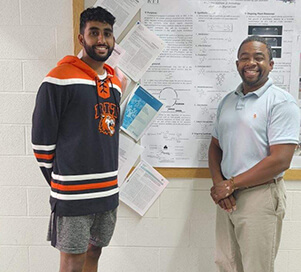
Name: Gaurav Cheema
Mentor: Dr. Michael Coleman
College: Rochester Institute of Technology
Year: Rising Senior
Major: Bio-chemistry
Pronouns: He, His, Him
Gaurav’s family is originally from India. He and his sister are the first to go to school in the US for undergraduate college level studies. His sister is a biomedical engineer, and his mom went to Rochester Institute of Technology (RIT) for a graduate program. Gaurav likes to play soccer, and is the goalie for RIT’s soccer team.
Gaurav took a chemistry class in high school and liked both the chemistry program as well as the hands on experience in the lab that gave answers to inquiries. He liked both math and science, and then realized in order to do chemistry, he needed to know aspects of biology as well in order to enter the career field he wanted. He is interested in the application of the science, the background of where chemistry came from, and for what applications it can be used.
Gaurav is working with Dr. Coleman this summer on organic synthesis. They are focusing on the synthesis of a Novel Class of Chiral Silver N-Heterocyclic Carbene(NHC) Catalysts. Since Chiral Metal NHC catalyst have remained a relatively unexplored area of catalytic asymmetric organometallic transformations, Gaurav and Dr. Coleman are especially interested in exploring this novel class of chiral catalysts as an enabling technology for the efficient and selective access to complex active pharmaceutical ingredients and other chiral molecules.
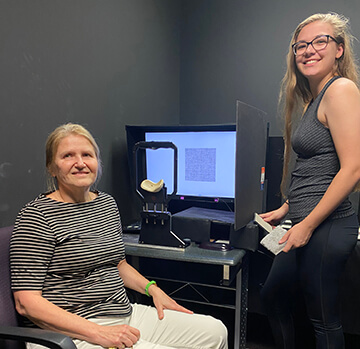
Name: Elise Guth
Mentor: Dr. Elena Fedorovskaya
College: Rochester Institute of Technology
Year: Rising Sophomore
Major: Physics
Pronouns: She, They
Elise loves softball and is on the varsity RIT softball team. She says she is really into Dungeons and Dragons, the role-playing game that lets the player create mighty heroes and solve puzzles.
Her mom is a kindergarten teacher, and her dad never finished college, so she is the first to major in science. She says she chose science to prove people wrong who said she wouldn’t be able to do it.
When Elise was in second or third grade, she though being an engineer sounded fancy, so that was the first job idea that really inspired her to pursue a STEM career, which is a very male dominated field. She notes that in a physics class of 30-40 students, only a few are female. She has noticed, however, that she hasn’t come across any gender biases in her classes at RIT.
She became interested in the summer Inclusive Excellence fellowship program when she received an email from professor Zemcov. She commented that she was interested in gaining more experience in a more diverse environment, so she applied to work with Dr. Elena Fedorovskaya.
They are working on the interaction between how one visually perceives things versus perceiving them through touch—visuo-haptic.
They have a large screen where volunteer participants are looking at the screen with objects that are textured. At the same time, inside a box is material participants are touching without seeing it. They are to determine whether what they are touching is what they are in fact looking at. They have three options of what to identify as the object they are touching.
The researchers also hook up the volunteers to an EEG system to see how their brain responds to what is happening while participants are thinking and figuring out what they are seeing and touching.
“Depending on the results we get, we might continue the EEG data further or begin to use Virtual Reality (VR) in extended testing,” Elise added.
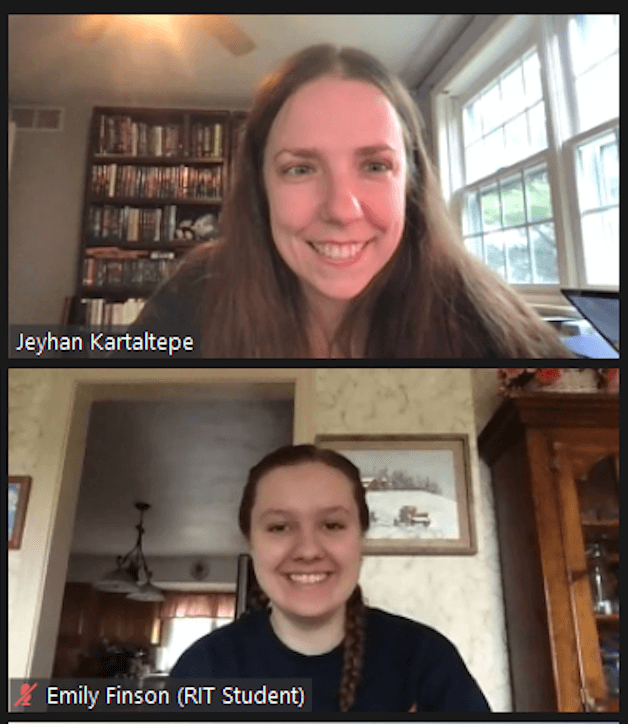
Name: Emily Finson
Mentor: Dr. Jeyhan Kartaltepe
College: Rochester Institute of Technology
Year: Rising Junior
Major: Physics
Pronouns: She, Her, Hers
Emily was born and raised in Jamestown, NY. She is the oldest of four children and has a twin sister and two younger brothers. From eighth grade until her high school graduation, she was homeschooled in order to train full-time as a competitive figure skater. She still skates as often as possible and, if she’s not in class, she can usually be found at the ice rink.
Math and science were always her favorite subjects in school when she was growing up, but never really thought that it was something she could do as a career. Her interest in science grew during her time at Jamestown Community College (JCC). There, she had great physics and chemistry professors who encouraged her to pursue science. Before coming to RIT, she was able to graduate from JCC with a associates degree in mathematics and chemistry.
She became interested in the RIT Inclusive Excellence program while working on a research project with Dr. Kartaltepe during the spring semester. While it was her first time getting involved in research, she was eager to continue working on her project. “I am very grateful to the IE program for making it possible for me to continue my research this summer,” Emily comments.
Her summer project with Dr. Jeyhan Kartaltepe is entitled “Analyzing Extragalactic Spectroscopy from the Subaru Telescope.” COSMOS is an ongoing project working toward building a public online database of archival (previously collected) spectroscopic data. This data, collected from the Gemini, Subaru, VLT and Hubble Space Telescopes, is then reduced and processed to create two-dimensional and one-dimensional spectra for all galaxies. This summer she is working with a data set collected from the camera and spectrograph, MOIRCS (Multi-Object InfraRed Camera and Spectrograph), on the Subaru telescope positioned atop Mauna Kea in Hawaii. She is reducing the spectroscopic data using SpecPro, a computer program created by the California Institute of Technology for analyzing and viewing spectra, extracting spectra, and measuring the redshift and emission line fluxes of galaxies in the data set. Following this, further analysis will be done with the data to determine other galactic activity such as star formation rates and active galactic nuclei.
Strand 2: Classroom Environment
Classroom Strand Focus: Concentration is on classroom practice methods by creating new classroom materials that promote student metacognition (understanding how they individually learn best) and sense of identity, as these have been shown to address many negative cultural messages students receive about their place in science. Examples include short reflections on individual strengths (affirmation exercises) or how different disciplines connected (e.g. how math concepts arise in physics). Activities will be short, so faculty can incorporate 1-2/week without significantly impacting content and keeping continuity across campus.
Goals
- Introduce faculty to metacognitive strategies that improve student identity and learning
- Create classroom environments that encourage a sense of belonging and growth mindset
- Increase faculty and student awareness about stereotype threat, gender bias, and the impact of societal stereotype
Program Activities
- Faculty participate in a series of co-learning workshops, developed to encourage metacognitive practices in the classroom. Activities include demonstrating how to approach a given learning task, monitoring comprehension, and evaluating the progress toward the final completion of a task.
- Workshops run as a year-long cohort to encourage a sense of community for faculty to openly express concerns and questions.
- Faculty share information about discipline-specific metacognitive activities and form a peer-mentoring group to support one another through implementation.
Cohort Objectives
- Create new guidelines and promote existing classroom materials that encourage student metacognition (critical awareness of one’s thinking and learning process).
- Encourage faculty understanding of student identity and ways to instill in them a positive place in science.
- Support students in recognizing how disciplines connect (e.g. math concepts and physics).
- Increase faculty use of metacognitive approaches with intention, transparency and consistency.
Strand 3: Community
The focus of this work is on fostering a welcoming and inclusive informal community through a series of community building events and “Playback Theatre” workshops. The theater component introduces actors who recreate participant narratives around issues of identity and inclusivity to create stronger bonds between faculty and students. The Community Strand will work with existing (and newly created) student and faculty/student groups across the college to identify common challenges in the culture.
This strand has a highly dedicated group of faculty liaisons. They meet regularly, go through trainings, and work together to take part in events, workshops and programs that encourage inclusiveness and community well-being among all on campus.
Playback Theatre: Diversity Theater at RIT uses theater and theatrical techniques as a means of creating meaningful audience experiences within the context of diversity and inclusion education. This form of improvisational theater is practiced worldwide, and focuses on promoting social change leading to healthier, more civically engaged and inclusive communities.
Goals
- Foster a welcoming and inclusive environment in the College of Science
- Identify and enable faculty leaders in community building
- Identify common challenges and generate new faculty/student groups and activities across the college
- Strengthen existing community connections across campus
- Utilize theater to spark meaningful discussions between faculty, staff and students around issues and experiences with diversity and inclusivity
Community Activities
- Regular discussions on issues affecting the College climate
- Identification of gaps or obstacles in existing organizations and events
- New social events to break down barriers between faculty and students
- Development of a robust network of partnerships with inclusive student groups and support programs, other members of the RIT community, and alumni from diverse backgrounds and career paths.
Diversity Theater Workshops
- Engage small cohorts of students, staff, and faculty in discussions within the context of diversity and inclusion education.
- Foster community building, social change, and a deeper understanding of one another.
- Experience dynamic multi-sensory storytelling using Playback Theatre presented by RIT Diversity Theater actors and musicians to present stories shared by the participants around a common theme.
- Workshop themes include: Inclusion starts with “I”, Unconscious Bias & Diversity Awareness, Active Bystander Awareness, and Transformative Experiences
Events
RIT faculty, staff, and students take part in community-building discussions and outings highlighting on-topic experiences for the Inclusive Excellence initiative.
Location: GOS-1174 with Virtual Option
Time: 1:00p.m. - 2:00p.m.
Description: Scott David Cohen on Inclusive STEM Education for Deaf and Hard of Hearing Students
Location: Virtual
Time: 1:00p.m. - 2:00p.m.
Description: Dr. Stephanie Pinder-Amaker, Dr. Lauren Wadsworth: Authors of “Did That Just Happen?! Beyond “Diversity” - Creating Sustainable and Inclusive Organizations”
Location: Virtual
Time: 1:25p.m. - 2:15p.m.
Description: Dr. Michael J. Williams: Continuing the Search for Equity, Advancing the Need for More Representation of Black Scientists in Optics and Photonics
Location: Virtual
Time: 1:25p.m. - 2:15p.m.
Description: Workshop: Transparent Assignments
Facilitated by Leah Bradly, Assistant Director of Educational Effectiveness Assessment
Location: Virtual
Schedule: September 17, October 8, October 15, October 29, November 12, November 19, December 3
Time: 1:25p.m. - 2:15p.m.
Description: IE Book Club will meet bi-weekly via Zoom to discuss “Did That Just Happen?! Beyond “Diversity” - Creating Sustainable and Inclusive Organizations”.






























